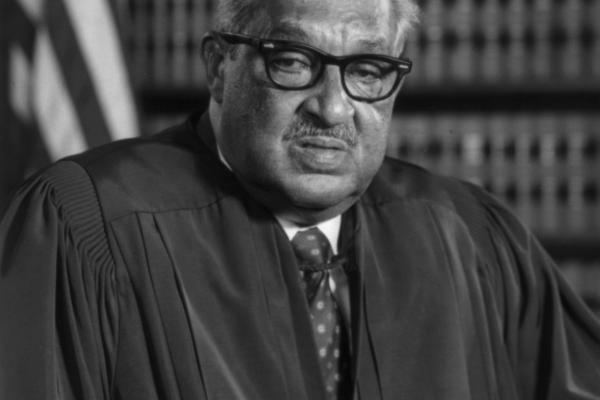On Aug. 30, 1967, Thurgood Marshall was confirmed by the United States Senate as the first African-American Supreme Court justice. Throughout his tenure as an associate justice of the Supreme Court, and even prior to his nomination by President Lyndon B. Johnson, Marshall left his mark on various cases that have pushed America closer toward being a fair and just society for all. His impact is still recognizable to this day.
Here are five Supreme Court cases through which Marshall fought for justice — often while he was on the other side of the bench — and won.
1. Argued for the Innocence of Four Black Men
Chambers v. Florida (1940)
Marshall, then a member of the NAACP’s legal counsel, argued on the floor of the Supreme Court for the innocence of four black men pressured by police officers to confess to murder. The Supreme Court ruled in favor of the men, finding that their confessions were coerced. Marshall’s work representing the four men marked a rare instance of white police officers being successfully called to task for their use of harsh tactics when interacting with black people.
2. Argued on Behalf of a Black Man Refused the Right to Vote
Smith v. Allwright (1944)
As the NAACP's Special Counsel, Marshall argued on behalf of Lonnie Smith, a black man who was refused the right to vote in a Texas primary election held by the Democratic Party. At the time, the state party could legally require its voters to be white. The Supreme Court ultimately voted in favor of Smith, allowing black Texans to register in primaries and exercise their right to vote.
3. Argued for Desegregation
Brown v. Board of Education (1954)
Marshall argued on behalf of 13 plaintiffs, black parents who believed that racial segregation in the public educational system was a detriment to their children, as many resources were going to white schools instead of black schools. The Supreme Court ruled unanimously in favor of the plaintiffs, and thus began a process of desegregating public schools nationwide.
4. Argued for Black Students' Rights to Peacefully Protest
Garner v. Louisiana (1961)
Marshall argued on behalf of black students at Southern University who sat in a restaurant only open to white people and refused to leave. The students were arrested by the police and charged with disturbing the peace. Marshall challenged the state’s charges and the Supreme Court unanimously ruled that the students had the right to protest peacefully.
5. Argued for the Eradication of the Death Penalty
Furman v. Georgia (1972)
As a Supreme Court justice, Marshall heard this case questioning the use of capital punishment in the U.S. The decision, to suspend the death penalty in the country, lasted four years.
Desiring a complete eradication of the death penalty, Marshall wrote a concurring opinion in which he wrote, “Death is irrevocable; life imprisonment is not.”
He continued,
At a time in our history when the streets of the Nation’s cities inspire fear and despair, rather than pride and hope, it is difficult to maintain objectivity and concern for our fellow citizens. But the measure of a country’s greatness is its ability to retain compassion in time of crisis.
Marshall’s work continually exemplified compassion for others, and it's in part because of him that many of the nation's social obstacles were overcome. Today we remember his legacy.
Got something to say about what you're reading? We value your feedback!

